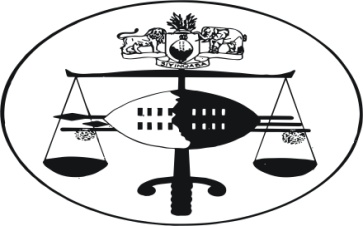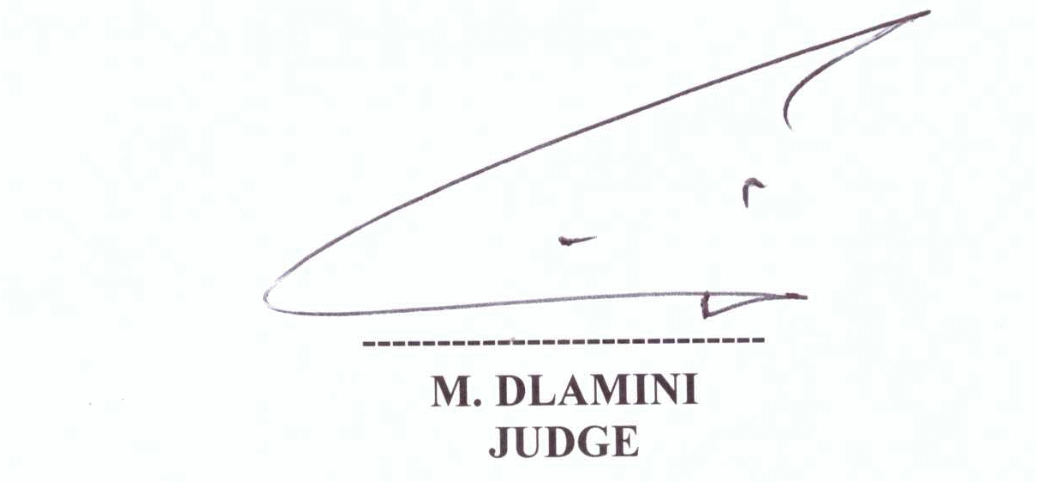
IN THE HIGH COURT OF ESWATINI
JUDGMENT
In the matter Between: Case No. 744/2019
SIBONISO CASSERIA Applicant
And
SOUTHERN AFRICA NAZARENE UNIVERSITY Respondent
Neutral citation : Siboniso Casseria & Southern Africa Nazarene University
(744/2019) [2019] SZHC 108(21st June, 2019)
Coram : M. Dlamini J
Heard : 8th May, 2019
Delivered : 21st June, 2019
Rule 41 - an applicant or plaintiff withdrawing its application or action process is not obliged to divulge the reasons for its withdrawals - this general rule though applies only where there is a tender for costs - where however a costs order is registered, the withdrawing party must give “very sound” reason for its withdrawal
in order to send a message that courts of law shall not tolerate abuse of court processes by litigants filling futile application, a costs order must be meted against the applicant.
Summary: The respondent insists on a costs order as a result of applicant withdrawing his application. The respondent’s Counsel submitted that its appearance on behalf of respondent was pro bono and that the defence by respondent is a factual circumstance.
The Parties
[1] The applicant is said to be a Swazi adult and a resident of kaKhoza area in Manzini. He is a male and a student at respondent’s institution. The respondent is a medical learning institution, responsible for training nurses. It is situate in Mbabane, Mahwalala area, Hhohho region.
Applicant’s Averments
[2] The applicant asserts in his founding papers that he was enrolled at respondent’s institution under the faculty of Health Sciences as a first year student. He was elected as a class representative. He then prayed:
“5. That pending the final determination of the appeal filed by the applicant regarding the decision to suspend him, the 1st Respondent, its representatives, agents, or anyone that derive title from it be interdicted to[sic]set aside the student’s suspension from the institution.”
[3] He was convicted of the offence of malicious damage to respondent’s property and sentence to suspension until July 2019. He subsequently appealed his conviction and sentence. He further asserted:
“7. I wrote a letter to the registrar of the institution about my appeal and I was informed to write to the Vice Chancellor of the school. I then wrote a letter to the Vice Chancellor explaining my situation of how I had appealed the decision and the appeal had not been dealt with. The Vice Chancellor did not respond. I then decided to approach the Dean of Student Affairs, to tell him about my situation. The Dean of Student Affairs told me to return to class. I returned to class.
8. In the mid of the month of April, 2019 I met the Dean of the Health Services faculty in the university premises who then questioned me about my suspension. I explained that it was the Dean of Student Affairs who permitted me to return to class. The Dean of Health Sciences, through a letter from registrar, then told me to leave the institution because I was trespassing, and further not to return until my suspension ends.”
[4] He lamented respondent’s failure to prosecute his appeal as follows:
“9. I am not the one who has failed to prosecute my appeal. I am not responsible for constituting the board to deal with my appeal.”
Respondent’s answer
[5] The respondent contradicted applicant’s assertion by pointing out that:
“9.
AD PARAGRAPH 6
The contents thereof are untruthful, misleading and mischievous on the part of the Applicant. The applicant’s appeal was dully determined by the University Council and the Applicant was duly informed of same on the 22nd May 2018.” I refer this Honourable Court to annexure “F” being the verdict as well as the Confirmatory Affidavit from the Deans of Health Sciences Secretary who handed the verdict to applicant on the 22nd May 2018.”
Parties’ submissions
[6] On the hearing date, applicant’s Counsel submitted that the basis for the application was that the respondent was failing to prosecute applicant’s appeal. On service of the answering affidavit, applicant accepted that his appeal was prosecuted to the finality and was advised of the verdict. Learned Counsel then applied to have the whole application withdrawn. Counsel on behalf of respondent applied that a costs order should be mulcted against applicant who wasted not only its client’s time and resources but the court’s as well. Applicant’s Counsel replied that applicant was an indigent student who could not afford even his own lawyer’s fees. He was appearing pro bono.
Issues
[7] Should the court order a costs order in the circumstances of the case?
Determination
[8] Rule 41 deals with, among others, withdrawal of matters in court. It stipulates:
“41(1)(a) A person instituting any proceedings may at any time before the matter has been set down and thereafter by consent of the parties or leave of the court withdraw such proceedings, in any of which events he shall deliver a notice of withdrawal and may embody in such a consent to pay costs; and the Taxing Master shall tax such costs on the request of the other party.
41(1)(c) If no such consent to pay costs is embodied in the notice of withdrawal, the other party may apply to court on notice for an order for costs.”(My emphasis)
[9] Writing on the costs order provision after withdrawal, Hebstein and Van Winsen1 espoused:
“Where a litigant withdraws an action, very sound reasons must exist why a defendant or respondent should not be entitled to his costs. The litigant who withdraws an action or application is in the same position as an unsuccessful litigant.”(My emphasis)
[10] The learned authors then referred to Germishuys v Douglas Besproeiingsraad2 where Van Rhyn J held:
“Where a litigant withdraws an action or in effect withdraws it, very sound reasons must exist why a defendant or respondent should not be entitled to his costs. The plaintiff or applicant who withdraws his action or application is in the same position as an unsuccessful litigant because after all, his claim or application is futile and the defendant, or respondent, is entitled to all costs associated with the withdrawing plaintiff or applicant’s institution of proceedings.” (My emphasis)
[11] I must hasten to note that an applicant or plaintiff withdrawing its application or action process is not obliged to divulge the reasons for its withdrawals. This general rule though applies only where there is a tender for costs. Where however a costs order is registered, the withdrawing party must give “very sound”3 reasons for its withdrawal.
[12] Following the above ratio decidendi on costs as a result of withdrawal of a matter, the question for determination is whether applicant has advanced “very sound”4 grounds to warrant a no costs order, contrary to the provisions of Rule 41(1) (a). Two reasons have been advanced on the grounds for withdrawal. The first ground is that upon respondent revealing the factual circumstance that applicant’s appeal was prosecuted to finality, applicant threw the towel and admitted that indeed his appeal was prosecuted to finality. Applicant’s Counsel pointed out that this admission was contrary to his initial instruction that respondent had failed to have his client’s appeal prosecuted. It was on this ground that the withdrawal was made. The second reason for resisting a costs order is that applicant is an indigent student. He could not even pay his own Counsel who had to appear pro bono.
Are the above reasons “very sound”?
[13] Firstly, it is clear that the applicant misdirected his own lawyer when he deposed that the respondent was failing to prosecute his appeal. When confronted with the facts, he instructed his lawyer to withdraw the application. It is undisputed that by his application, the applicant caused respondent to expend not only time but money. Respondent had to hire the services of an attorney, spare time to answer to applicant’s application. A number of respondent’s officials had to attend to applicant’s application. This is evident by the number of confirmatory affidavits attached to the Registrar’s answering affidavit. The Registrar of respondent, a high ranking official who has a handful of obligations had to put aside time to attend to applicant’s application. What exacerbates applicant’s application is that from applicant’s own words and conduct his application was as per Rhys J futile.
[14] Applicant contends further that Rule 41 should not apply to him because he is indigent despite his unbecoming conduct of levelling spurious allegations against the respondent. Applicant’s legal Counsel confirmed applicant’s status of poverty. He submitted that he accepted instructions from applicant without any fees.
[15] The question is, Should the court order applicant to pay costs nevertheless? I am very much alive to the principle of our law that courts should issue orders that can be complied with. I am very mindful that should the applicant fail to comply with the costs order, which is highly likely as I have no reason to disbelieve applicant’s Counsel, respondent may bring a contempt of court application later. The end result of this application would be to commit applicant to goal. Once applicant is committed to goal, he might miss out on his studies which this court is very much keen to see him complete successfully. Now should the court overlook the provisions of Rule 41? The dilemma is caused by applicant bringing an application based on spurious averments. It is precipitated by his indigence while a student at the same time. It is a duty of this court to uphold the law at the same time protect the interest of the aspirant student such as to guard against factors disturbing his academic pursuit. I have already pointed out that a costs order against applicant is one such interfering factor.
What is the best solution therefore?
[16] It is my considered view that in order to send a message that courts of law shall not tolerate abuse of court processes by litigants filling futile application, a costs order must be meted against the applicant. However, for the reasons that applicant is presently not in a position to pay costs owing to his indigence as a student, the court shall postpone the costs order against applicant to be complied with in July 2023, a period envisaged that applicant would be fully employed by then. I must clarify that whether applicant is employed or not, applicant is ordered to pay the taxed costs in July, 2023.
[17] In the final analysis, applicant is ordered to pay respondent:
Costs of suit;
Order to be complied with not later than 31 July 2023;
Interest thereof at the rate of 2% per annum from date of judgement.

For the Applicant : S. Gumedze of V.Z. Dlamini Attorneys
For the Respondent : F. Tengbeh of S.V. Mdladla & Associates
1 The Civil Practice of the High Court & the Supreme Court of Appeal of South Africa 5th ed (2009) Juta at 749
2 (1973(3) SA 299)
3 op. cit
4 (as per Rhyn J Supra)
10